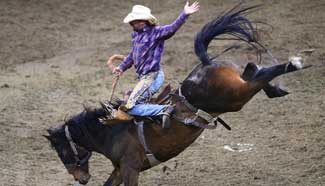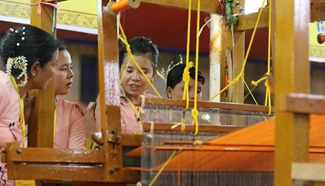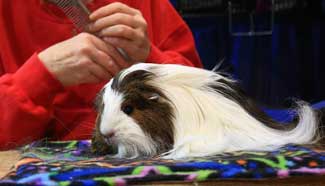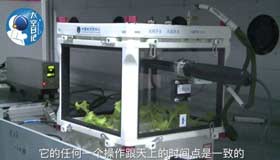BEIJING, Nov. 14 (Xinhua) -- In the Hollywood science fiction movie "The Martian," the astronaut stranded on the Red Planet lives on potatoes he grows there for more than 500 days while awaiting rescue.
But will potatoes really grow on Mars one day? Although humans haven't set foot on Mars, astronauts have tasted lettuce grown on the International Space Station.
On Tiangong-2, China's first space lab which was launched in September, an experiment is underway to grow rice and thale cress (Arabidopsis thaliana), a kind of vegetable.
Chinese scientists hope the plants will go through the whole cycle, from seed to seed.
Scientists are eager to know whether plants in space -- where there is no distinction between up and down, day and night and different seasons -- still blossom according to an Earth-based cycle, and yield the same seeds.
"We want to study the growth rhythm and the flowering of plants in micro-gravity conditions," says Zheng Huiqiong, chief scientist in charge of plant research on Tiangong-2, and a researcher with the Institute of Plant Physiology and Ecology of the Shanghai Institutes for Biological Sciences under the Chinese Academy of Sciences (CAS).
"So far, the plants on Tiangong-2 have been growing well. Some Arabidopsis thaliana are blooming, and the rice is about 10 centimeters tall," Zheng says.
When the two Chinese astronauts who flew the Shenzhou-11 spacecraft to the space lab on Oct. 17 return to Earth later in November, they will bring back samples of the Arabidopsis thaliana, which is expected to yield seeds in space, says Zheng.
The rice experiment will continue on Tiangong-2 for about half a year. "This is China's longest plant-growing experiment in space," says Zhang Tao, a researcher with the Shanghai Institute of Technical Physics of CAS, who is in charge of developing the plant incubator on Tiangong-2.
"Unlike similar experiments on the International Space Station usually conducted by astronauts or biologists on board, we designed the incubator so scientists on Earth can remotely control the lighting, temperature, humidity and volume of the nutrient solution during the experiment," Zhang says.
If humans want to explore the universe, scientists say, the development of life and ecological support systems is essential to provide the necessary oxygen and food for long-duration space activities.
If humans want to establish bases on the moon or Mars, growing crops will be a key task. But so far, there is no successful example of growing plants in a totally enclosed environment needed on the moon or Mars.
"We cannot avoid the issue of growing crops and vegetables, if we want to live on Mars. Only when we grow plants well in space, can we go deeper into space," Zheng says.
"If we can conduct research on Mars, potatoes are a good choice. We could also try growing tomatoes, cucumbers, rice and wheat," Zheng says.










